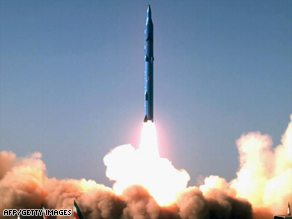TEHRAN, Iran (CNN) -- Iran announced Wednesday that it successfully tested another "Sajil" missile, a surface-to-surface missile with a range that makes it capable of reaching parts of Europe.

Image purportedly shows the test launch of Iran's new Sajil surface-to-air missile.
A similar test was carried out in November.
The United States confirmed that Wednesday's test of the missile -- with an approximate range of 2,000 km (1,200 miles) -- was successful, a U.S. intelligence official told CNN. The official did not want to be named for security reasons.
When asked if the missile indicates a new capability for the Iranians, the official said, "it advances the ball somewhat."
The test shows that the Iranians are looking to increase the sophistication of their ballistic missile program, and to increase their weapons stockpile, the official said.
The test should be more of a concern to Europe than to Israel, since previous missiles tested by Iran could already reach the Jewish state, an Israeli official said.
"If anyone had any doubt, it is now clear that the Iranians are playing with fire," Israeli Deputy Minister of Foreign Affairs Danny Ayalon said Wednesday in an interview on Kol Israel Radio. "We know that the Iranians are developing capabilities of thousands of kilometers, that could reach the coasts of the United States. ...
"The Iranian clock is ticking fast and it must be stopped."
State media reported that the missile -- a Sajil-2 -- was launched Wednesday morning from the northern Iranian city of Semnan and reached its target. The report did not say where it landed.
The Sajil is a new generation of surface-to-surface Iranian-made missiles that "demonstrates a significant leap in Iran's missile capabilities," Uzi Rubin, the former director of Israel's Ballistic Missile Defense Organization, told Jane's Information Group after the November test.
"Regardless of the success of the test, this missile places Iran in the realm of multiple-stage missiles, which means that they are on the way to having intercontinental ballistic missile capabilities," he said.
Sajil missiles are powered by solid fuel, which uses smaller containers and helps the rockets travel longer distances, President Mahmoud Ahmadinejad told the semi-official Fars News Agency.
Iran says the missiles have a range of almost 2,000 km (1,243 miles). If that is true, the missile brings Moscow, Athens and southern Italy within striking distance from Iran, according to Jane's -- which provides information on defense issues.
After the November launch, the United States restated its objection to such tests, saying they violate Iran's obligations under United Nations Security Council resolutions.
U.S. officials have cast doubt on the success of past missile test launches by Iran, including a rocket launch in August and a series of missile tests in July.
Wednesday's reported test comes after Israeli leader Prime Minister Benjamin Netanyahu met with U.S. officials in Washington to discuss how to deal with the potential of a nuclear-armed Iran. He met Tuesday with the Senate Foreign Relations Committee, House Speaker Nancy Pelosi and House Minority Leader John Boehner.
President Barack Obama, who met with Netanyahu on Monday, stuck by his refusal to commit to an "artificial deadline" for Iranian negotiations on its nuclear program. But he also warned that he would not allow such talks, which he expects to accelerate after the Iranian presidential election in June, to be used as an excuse for delay.
He said the United States is not "foreclosing a range of steps, including much stronger international sanctions, in assuring that Iran understands that we are serious."
Netanyahu wanted a time limit for negotiations relating to such ambitions, with the threat of military action if no resolution is reached.
Both Israel and the United States believe that Iran is seeking nuclear weapons under the guise of a civilian nuclear energy program; Tehran denies the accusation. Israeli leaders have pointed to Ahmadinejad's calls for the end of Israel as a Jewish state, and argue that quick action is needed.
Netanyahu called Iran the biggest threat to peace in the region.
"If Iran were to acquire nuclear weapons, it could give a nuclear umbrella to terrorists, or worse, could actually give (them) nuclear weapons. And that would put us all in great peril," he said.
Obama is considered to have a more conciliatory approach to the Arab and Muslim world than Netanyahu. Sphere: Related Content![Validate my Atom 1.0 feed [Valid Atom 1.0]](valid-atom.png)























































Nenhum comentário:
Postar um comentário